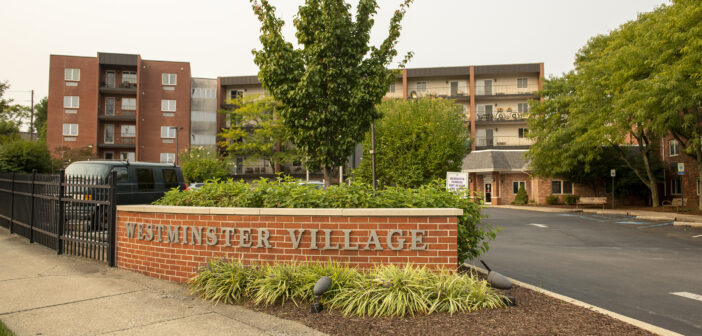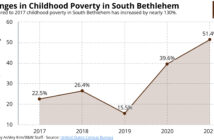They lived vibrant lives.
Even though they were the senior population, even though they were living in assisted living facilities staffed with nurses, social workers and psychologists, they lived vibrant lives.
Their days consisted of eating meals together, chatting about the news, exploring local restaurants, watching movies, exercising and attending book clubs.
But now, the doors to the centers were shut. Meals with friends turned into Styrofoam containers delivered bedside. Beloved nurses were hidden behind PPE equipment, masking their once familiar humanity. Visits with loved ones were confined to the screen of an iPhone.
This was the new, dark, lonely reality for seniors amid the COVID-19 pandemic.
As the pandemic swept across the country, Lehigh Valley senior care centers were adapting long-standing protocols to keep their residents safe. No outside visitors were allowed in and seniors were confined to their rooms. Ensuring high quality physical and mental health while the world turned upside down became the main priority for staff. According to data provided by the Pennsylvania Department of Health, as of Dec. 2, the Commonwealth has reported a total of 375,431 positive cases of COVID-19, with 36,628 cases — 9.76 percent — among residents in senior care facilities.
Lehigh County had 37 senior care facilities with positive COVID-19 cases, reporting 1,379 cases among residents, 359 cases among employees and 305 deaths.
Northampton County saw 26 senior care facilities experience positive COVID-19 cases, with 1,074 cases among residents, 301 among staff and 267 deaths.
Nancy Bullivant, executive director of Westminster Village, a continuing care retirement community in Allentown, has worked in nursing for almost 40 years. She said the COVID-19 pandemic is the toughest thing she has experienced throughout her career with senior care.
Westminster Village saw a total of 67 positive COVID-19 cases in residents as of publication, with 44 recoveries, 6 discharges and 17 deaths.
“Everything stopped when the governor put in the emergency limit on visitations in the middle of March and we experienced our first positive (COVID-19) case April 3,” Bullivant said. “There was a lot of illness with those cases; it impacts seniors pretty significantly as far as their medical conditions, so we had a lot of significant medical treatment going on.”
Bullivant said many residents talk about how they went through a similar situation when the flu first came about.
Jaqueline Slatick, director of nursing at Westminster Village, said the pandemic has changed how the center is able to deliver care and interact with residents. She said the geriatric population seems to be taking it in stride.
“Some of them that have cognitive disabilities; it’s hard for them to understand why they have to stay in their rooms or why we’re wearing all this protective equipment and maybe it was probably scary for them because they don’t understand, so you’d have to constantly reorient them and explain to them what was going on,” Slatick said.
Gabe Robinson, a social worker at Cedarbrook Senior Care and Rehab in Allentown said the pandemic has been a “depressing time,” but the staff and residents are trying to make the best of it. Robinson said Cedarbrook has seen a significant number of residents test positive for COVID-19.
He said residents with dementia and Alzheimer’s do not always know what is going on, meaning staff need to engage in a constant re-education process.
David R. Funk, a geriatric psychologist with the Psychological Association of Bethlehem has been specializing in seniors for 40 years.
Funk said as routine social activities for seniors were severely curtailed due to the pandemic, residents were quarantined to their rooms and would often not see anyone except their roommate and caregivers, creating an elevated sense of loneliness.
“People are social beings and people that live in long-term care tend to establish groups of friends and neighborhoods,” Funk said. “There are people that eat together routinely, will meet together, go to bingo together and suddenly they’re cut off from these friends and the only way they can reach them is to call them if they have a telephone.
He said as a psychologist he worked to help patients control their anxiety and depression during a devastating, isolating time.
One of his patients was particularly anxious about the pandemic and feared contracting the virus. Funk Facetimed with her on a Monday, and by Friday of the same week she had died due to contracting the virus.
“I think that there is now more of a sense of hopelessness and depression, due to this lack of social interaction,” Funk said. “People are social beings and this withdrawal from that has been very difficult not only on normal friendships, but there’s also been a negative cognitive effect. People are not being stimulated and there seems to be a more rapid cognitive decline in people.”
Robinson said educating not only residents on the pandemic but their family members as well is essential. He said sometimes the family members are more affected than the residents.
“I definitely see family members at times feeling it more than the residents because they feel helpless, they can’t do anything, they have to go off CDC (Centers for Disease Control and Prevention) guidelines and the guidelines that are presented to us that are handed down by the government,” Robinson said. “The family members feel that their hands are tied.”
Robinson said if the staff identifies depression in a resident, they address it by utilizing more Facetime calls with family and encourage more activities.
Robinson said Cedarbrook has facilitated drive-by visits so family members can visit residents and socially distanced activities for residents such as games and watching movies.
Slatick said Westminster Village adapted to comply with social distancing requirements by facilitating hallway bingo games, music activities and bringing an ice cream truck for residents one day.
Bullivant said since family members can no longer visit residents, the center has been facilitating virtual visits with tablets and computers so families can touch base with their loved ones. As regulations changed, Wesminster permitted in-person visits for those near end of life with the use of PPE and what were called “window visits,” where there was a barrier between the resident and visitor.
“It was amazing to me to see how strong both the residents and the staff were to get through this and the commitment of people in caring for our residents and the commitment of the residents to support each other; it’s been a pretty amazing experience,” Bullivant said.






Comment policy
Comments posted to The Brown and White website are reviewed by a moderator before being approved. Incendiary speech or harassing language, including comments targeted at individuals, may be deemed unacceptable and not published. Spam and other soliciting will also be declined.
The Brown and White also reserves the right to not publish entirely anonymous comments.